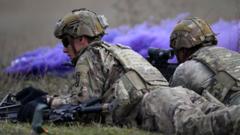In a recent address, NATO Secretary General Mark Rutte urged the military alliance's 32 member countries to adopt a "wartime mindset" in response to escalating tensions with Russia. He emphasized that current defense spending levels are insufficient for the potential conflicts anticipated in the coming years, particularly in the context of the ongoing war in Ukraine.
Rutte, who assumed his role in October, warned that the military situation was at its worst in his lifetime. He remarked that European NATO members, on average, were spending about 2% of their GDP on defense, a target set for 2024, but indicated that more financial commitment is necessary to adequately prepare for future conflicts. Specifically, he called on NATO countries to increase their defense budgets significantly, illustrating that past European expenditures during the Cold War had peaked at over 3% of GDP.
Highlighting the importance of collective security, Rutte noted that while NATO members agree to defend one another in the event of an attack, the current geopolitical climate—marked by Russia's heightened military expenditures and aggressive actions in Ukraine—demands immediate action. He pointed out that Russia's military budget is projected to comprise a substantial portion of its national budget by 2025, reflecting the Kremlin's readiness for prolonged military engagement.
Historically, former President Donald Trump had echoed similar sentiments regarding NATO nations needing to honor their financial commitments to the alliance. Rutte recognized Trump’s influence in redirecting NATO members to increase their defense allocations and expressed his intent to continue fostering a strong US commitment to European defense, despite uncertainty around Trump’s possible return to the White House.
Rutte's address also underscored the challenge NATO members face in managing public expectations, as many citizens prioritize economic issues like rising living costs and health care over military spending. He implored citizens across the NATO territory to advocate for increased defense budgets, warning that without such actions, the alliance could face severe difficulties within the next four to five years.
With Russia continuing to gain ground in Ukraine, Rutte's message serves as a rallying cry for NATO members to prepare adequately for future threats, asserting that proactive measures today could help avert much more significant costs in the years to come.






















